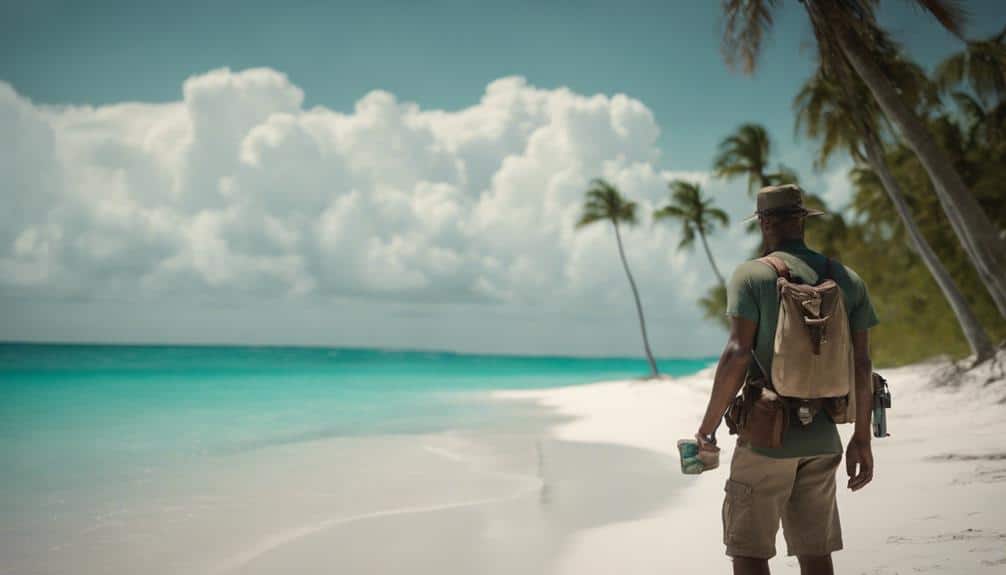Christopher Columbus was the first person to discover the Bahamas, landing on the island of Guanahani in 1492. His voyage was part of an effort to establish a trade route to Asia, but he mistakenly thought he had reached Asia upon arriving in the Bahamas. This event marked the initiation of European exploration and colonization of the Americas, leaving a significant historical impact. For further insights into Columbus’s life and the history of the Bahamas, explore his early upbringing, subsequent voyages, and the transformation of the Bahamas post-discovery.
Key Takeaways
- Christopher Columbus discovered the Bahamas in 1492 on the Island of Guanahani.
- The original inhabitants were the Lucayans/Arawaks who faced enslavement and extinction.
- The Bahamas saw various rulers including Spanish, Americans, and English.
- The first European settlement was established in 1647.
- Bahamas became a British Crown Colony in 1717.
Christopher Columbuss Early Life
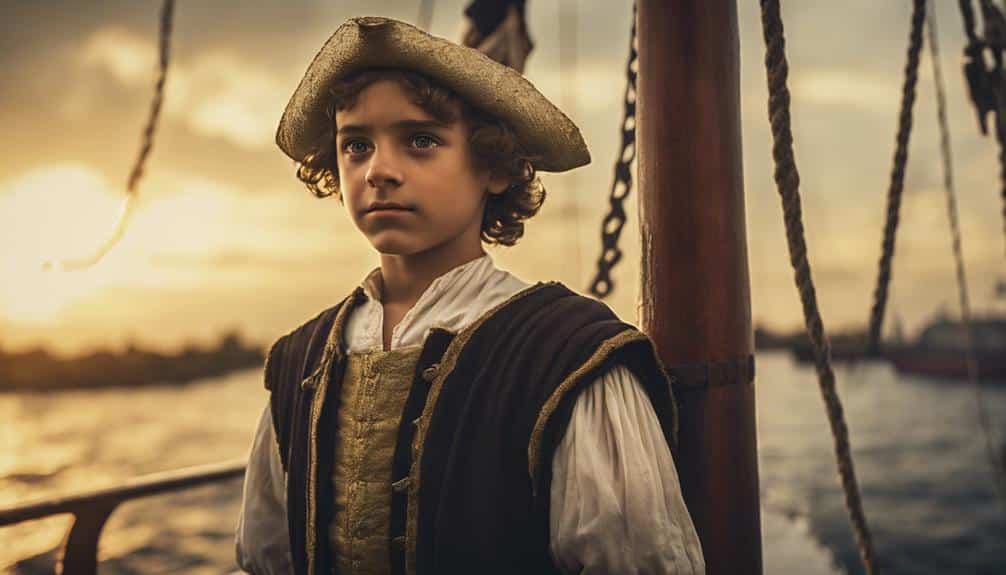
What formative experiences shaped Christopher Columbus’s early life, leading him on a path toward becoming a renowned explorer and navigator?
Born in Genoa between 25 August and 31 October 1451, Columbus was exposed to a diverse upbringing. His father, Domenico Colombo, a wool weaver, owned a cheese stand where Columbus assisted. In 1473, he started an apprenticeship as a business agent, honing skills that would later serve him in his explorations.
Columbus’s marriage to Felipa Perestrello e Moniz, daughter of a Portuguese nobleman, further enriched his cultural knowledge. Despite being self-educated, Columbus delved deeply into subjects like geography, astronomy, and history, laying a robust foundation for his future endeavors as an explorer.
Columbuss Quest for Asia
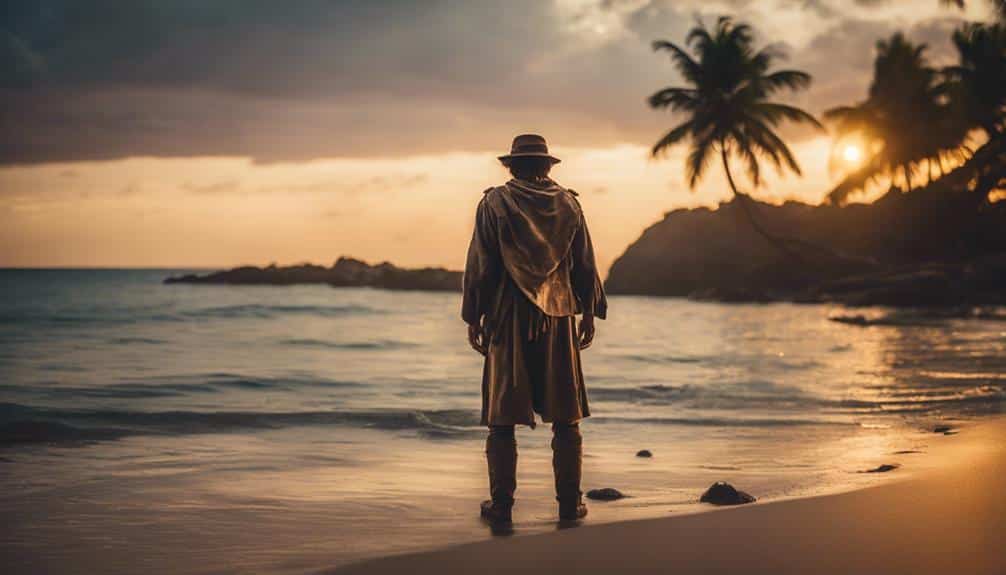
Christopher Columbus started his journey to discover a new route to Asia by sailing west from Europe in 1492. Despite his miscalculation of the Earth’s size, Columbus believed he had reached Asia upon landing in the Bahamas in October 1492. His voyage was primarily motivated by the desire to establish a lucrative trade route to Asia for spices and other valuable goods. This misconception led to the misnaming of the indigenous people he encountered as ‘Indians.’ Although Columbus did not find the direct route to Asia he sought, his voyage to the Bahamas marked the beginning of European exploration and colonization of the Americas.
- Columbus sailed west from Europe in 1492.
- Motivated by the desire to establish a trade route to Asia.
- Mistakenly believed he had reached Asia upon landing in the Bahamas.
- Misnamed the indigenous people as ‘Indians.’
- Initiated European exploration and colonization of the Americas.
Columbuss Voyages
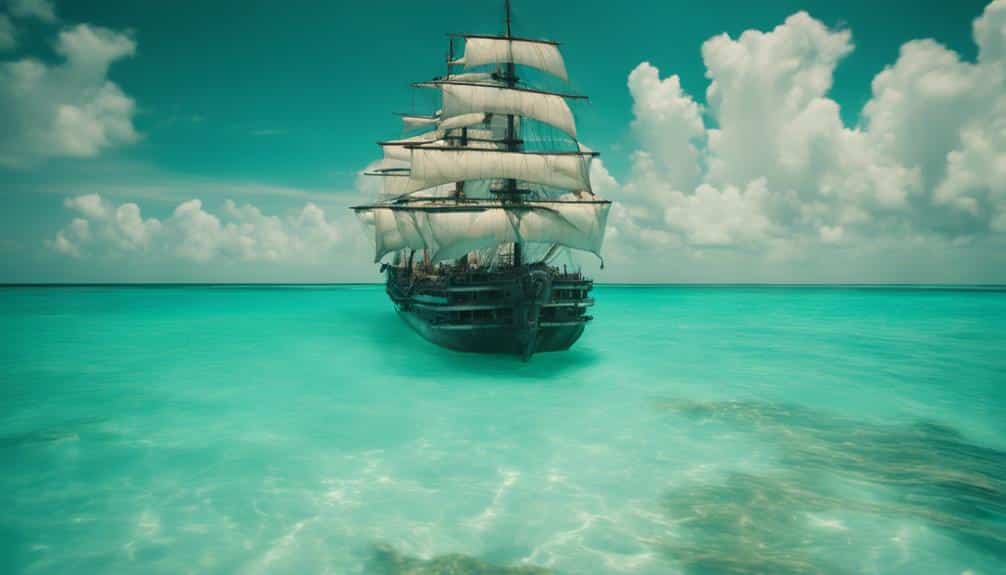
The exploration expeditions undertaken by Columbus, known as Columbuss Voyages, were pivotal in bridging the gap between the Old World and the New World during the Age of Discovery. Columbus made his first voyage to the Americas in 1492, where he discovered the Bahamas, specifically landing on the island of Guanahani (San Salvador). This event marked the first known encounter between the Spanish and the indigenous peoples of the American islands. The Spanish explorer’s arrival in the Bahamas was a significant moment that initiated European exploration and colonization of the New World. Columbus’s subsequent voyages to various Caribbean islands further solidified Spanish presence in the region, shaping the course of history and setting the stage for future conflicts like the Spanish-American War.
| Aspects | Details |
|---|---|
| Columbus’s Voyages | Bridged Old World with New World during Age of Discovery |
| Discovery Location | Bahamas, specifically Guanahani (San Salvador) |
| Impact | Initiated European exploration and colonization of the Americas |
| Spanish Influence | Established Spanish presence in the American islands |
| Historical Significance | Set the stage for future conflicts like the Spanish-American War |
Columbuss Later Life and Legacy
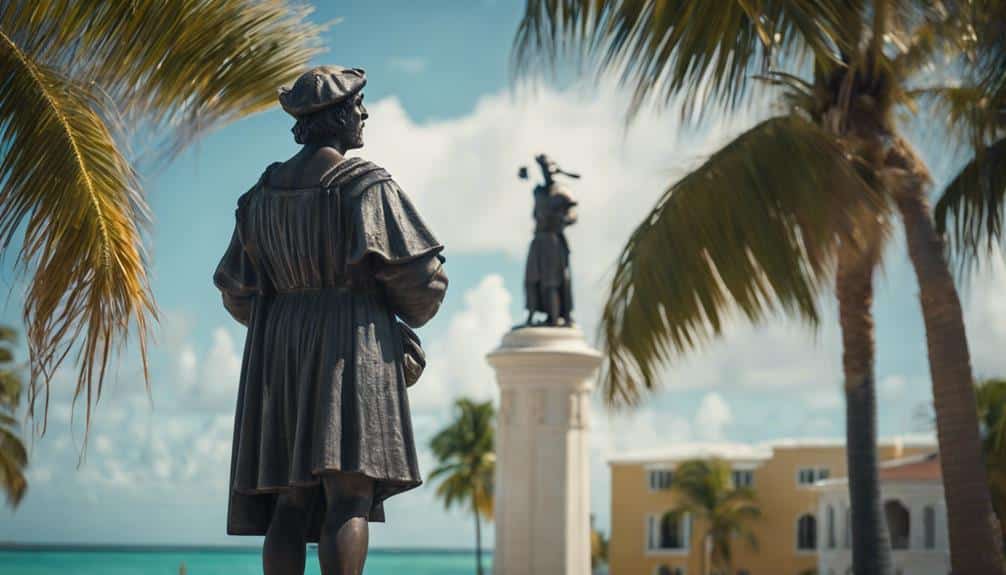
In the latter years of his life, Columbus grappled with controversies surrounding his treatment of indigenous populations and faced financial hardships despite his notable accomplishments in exploration.
- Columbus faced controversy and criticism for his treatment of indigenous peoples.
- Despite his achievements, Columbus struggled financially and fought legal battles for his rewards.
- Accusations of mismanagement and brutality tarnished Columbus’s legacy.
- The mystery surrounding Columbus’s burial place persists, with multiple locations claiming his remains.
- Posthumously, Columbus became a polarizing figure, with praise for his exploration contributions contrasting with condemnation for his actions towards native populations.
History of the Bahamas
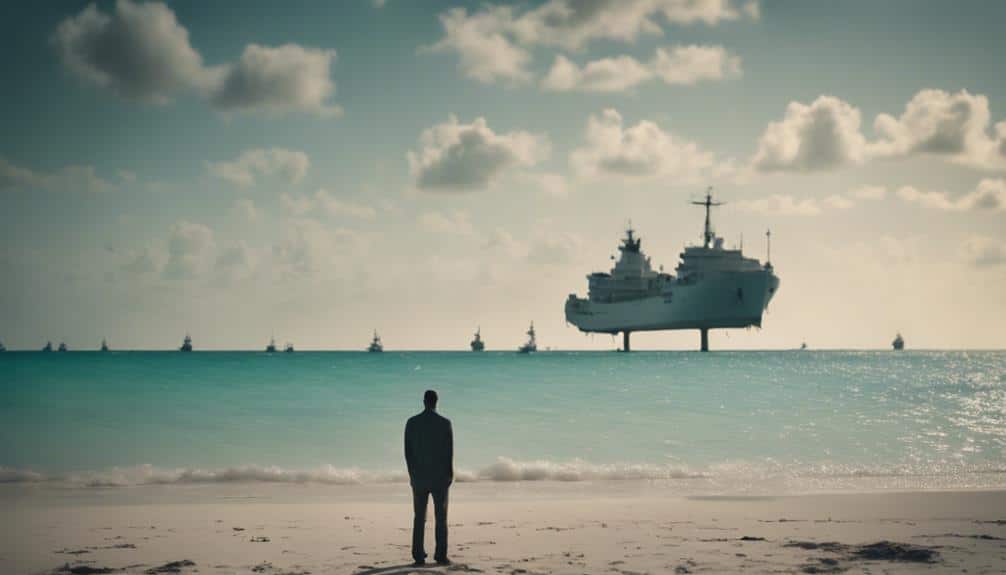
Amidst the legacy of controversies and financial struggles that marked Columbus’s later years, the history of the Bahamas emerges as a tale rich with diverse influences and shifting powers over the centuries. Christopher Columbus first discovered the Bahamas in 1492 on the Island of Guanahani (San Salvador). The original inhabitants, the Lucayans/Arawaks, tragically faced enslavement and extinction. The Bahamas saw various rulers, including the Spanish, Americans, and eventually the English. In 1647, English and Bermudian settlers established the first European settlement. Due to its use as a haven for pirates, the Bahamas became a British Crown Colony in 1717. This turbulent history reflects the struggles and changes experienced by the islands over the centuries.
| Historical Event | Year |
|---|---|
| Columbus discovers Bahamas | 1492 |
| Lucayans/Arawaks enslaved | 1500s |
| First European settlement | 1647 |
| Bahamas becomes Crown Colony | 1717 |
| Pirate activity in Bahamas | 18th century |
Frequently Asked Questions
Who First Discovered the Bahamas?
The discovery of the Bahamas is attributed to Christopher Columbus in 1492 when he made landfall on the Island of Guanahani (San Salvador). This event marked the initial European contact with the Bahamas, paving the way for subsequent exploration and colonization.
Who Were the Early Explorers of Bahamas?
Explorers who ventured into the Bahamas prior to Columbus include the indigenous Lucayans/Arawaks. European explorers such as Ponce de Leon and Juan Ponce de Leon also visited these islands. Columbus’ arrival in 1492 marked significant European contact.
Who Were the Original People of the Bahamas?
The original people of the Bahamas were the Lucayans, also known as Arawaks, who inhabited the islands peacefully for centuries. They had advanced systems and lived in the region before European contact, contributing to the Bahamas’ rich cultural heritage.
What Happened in 1834 in the Bahamas?
In 1834, significant changes occurred in the Bahamas as slavery was abolished. This marked a pivotal moment, impacting the labor force and agricultural practices. The end of slavery brought about new challenges and opportunities for former slaves, reshaping the social and economic landscape.
Conclusion
To sum up, the first person to discover the Bahamas was Christopher Columbus. Through his voyages in the late 15th century, Columbus stumbled upon the islands of the Bahamas while searching for a new route to Asia. His discovery not only changed the course of history but also opened up new opportunities for exploration and colonization in the Americas.
Columbus’s legacy as a navigator and explorer continues to be remembered and studied to this day.

